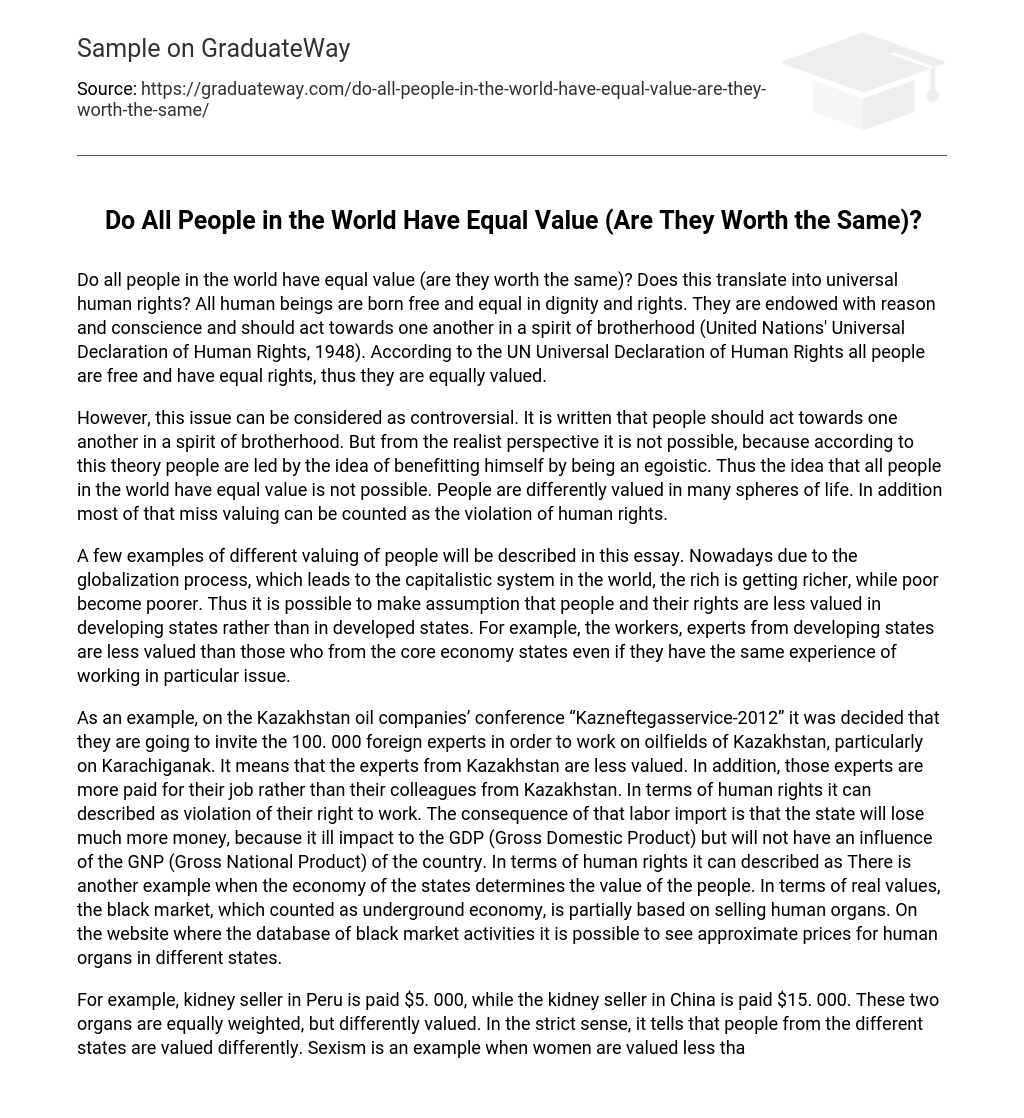Do all people in the world have equal value (are they worth the same)? Does this translate into universal human rights? All human beings are born free and equal in dignity and rights. They are endowed with reason and conscience and should act towards one another in a spirit of brotherhood (United Nations’ Universal Declaration of Human Rights, 1948). According to the UN Universal Declaration of Human Rights all people are free and have equal rights, thus they are equally valued.
However, this issue can be considered as controversial. It is written that people should act towards one another in a spirit of brotherhood. But from the realist perspective it is not possible, because according to this theory people are led by the idea of benefitting himself by being an egoistic. Thus the idea that all people in the world have equal value is not possible. People are differently valued in many spheres of life. In addition most of that miss valuing can be counted as the violation of human rights.
A few examples of different valuing of people will be described in this essay. Nowadays due to the globalization process, which leads to the capitalistic system in the world, the rich is getting richer, while poor become poorer. Thus it is possible to make assumption that people and their rights are less valued in developing states rather than in developed states. For example, the workers, experts from developing states are less valued than those who from the core economy states even if they have the same experience of working in particular issue.
As an example, on the Kazakhstan oil companies’ conference “Kazneftegasservice-2012” it was decided that they are going to invite the 100. 000 foreign experts in order to work on oilfields of Kazakhstan, particularly on Karachiganak. It means that the experts from Kazakhstan are less valued. In addition, those experts are more paid for their job rather than their colleagues from Kazakhstan. In terms of human rights it can described as violation of their right to work. The consequence of that labor import is that the state will lose much more money, because it ill impact to the GDP (Gross Domestic Product) but will not have an influence of the GNP (Gross National Product) of the country. In terms of human rights it can described as There is another example when the economy of the states determines the value of the people. In terms of real values, the black market, which counted as underground economy, is partially based on selling human organs. On the website where the database of black market activities it is possible to see approximate prices for human organs in different states.
For example, kidney seller in Peru is paid $5. 000, while the kidney seller in China is paid $15. 000. These two organs are equally weighted, but differently valued. In the strict sense, it tells that people from the different states are valued differently. Sexism is an example when women are valued less than men. From the ancient times the status of women in society was lower than men`s, when societies was absolutely patriarchic. After the waves of the feminism in the 1960`s, the situation has changed.
The women become more active in the social and political spheres. The ratio of women in the labor force increased. However, now it is not possible to say that both men and women have equal rights and equally valued. For example, in Kazakhstan according to the statistics the wage gap between men and women is significant. In 2008 it was founded that the large gender pay gap was equal to 36%. In addition, the women income growth rate is lower than men income growth rate. It is possible to observe this situation in most of the states of the world, not in the Kazakhstan.
One of the reasons of lower income growth rates is, mostly in governmental structures and companies men are higher sitting higher than men, men is a head. This is a stereotype that will not be broken in the nearest future. It means that men and women are not equally valued, and women are discriminated, even if it is not considered as the violation of human rights, in fact it is the violation of their rights. In addition, people can be differently valued due to the fact of the other types of discriminations such age or racial discrimination.
In conclusion, Even if all people in the world have equal rights when they are born, this may lead to the idea that all people in the world have equal value. However, in fact people valued differently. There are some reasons of different value of people, firstly their value is dependent on the state (developed or developing) in which they were born and living, secondly they are differently valued because of physical parameters, for example sex, age, and etc. The presence of different values of people means that the human rights are violated, thus it translates into universal human rights.





